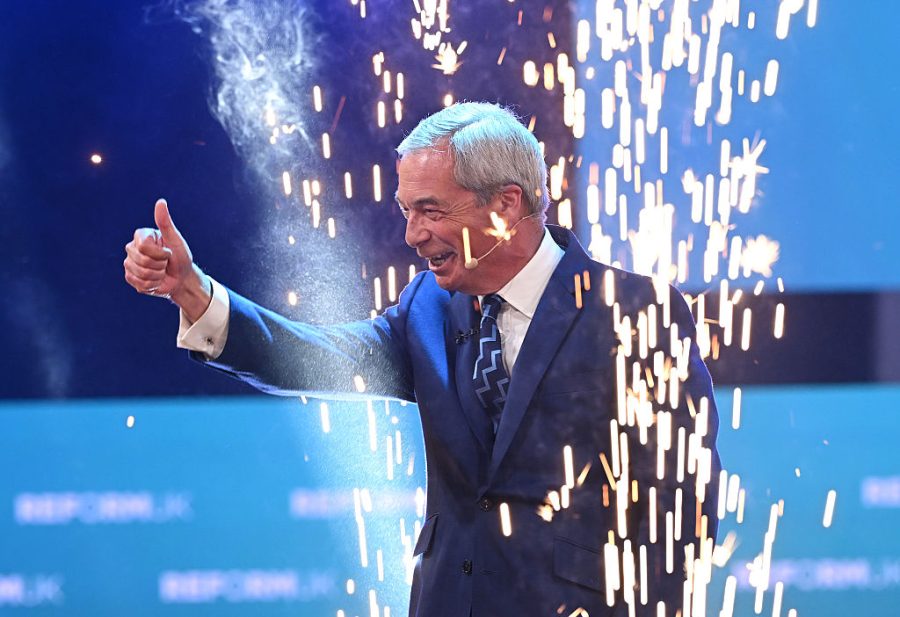Nigel Farage’s speech at the Reform party conference may have been, for the most part, heavy on spectacle and light on detail. But one crucial policy was offered: a pledge to ban the Muslim Brotherhood in Britain.
The Muslim Brotherhood was founded in 1928 with the goal of bringing about a universal caliphate under sharia law through political and non-violent means. Perhaps surprisingly, countries across the Middle East have already proscribed them, including Egypt, Saudi Arabia, the United Arab Emirates and Jordan. So why has no action been taken to deal with the group in the UK? To answer this question I will employ a phrase I heard many times from the ‘blob’ during my tenure as an adviser: it’s complicated.
David Cameron came close to proscribing the Brotherhood in 2015 after commissioning a review of their activities. The government found that ‘aspects of the Muslim Brotherhood’s ideology and activities…run counter to British values of democracy, the rule of law, individual liberty, equality and the mutual respect and tolerance of different faiths and beliefs’.
Despite this, they were let off the hook because ‘the Muslim Brotherhood is not the only movement that promotes values which appear intolerant of equality and freedom of faith and belief’. Cameron was unable to identify a reason to ban just this group, and not a whole slew of other organisations. This sort of ‘luxury belief’ – ‘luxury tolerance’ in Cameron’s case – has spelt disaster for Britain in recent decades.
This sort of ‘luxury belief’ – ‘luxury tolerance’ in Cameron’s case – has spelt disaster for Britain in recent decades.
To understand the Brotherhood’s goals, we should turn to its foundational texts. In 1964, Sayyid Qutb, the intellectual godfather of Islamism and a leading member of the Muslim Brotherhood, published Milestones, which set out how political Islamism can be advanced through every institution of state to achieve an Islamic world.
Qutb believes that ‘[non-Muslim] societies do not give [Islam] any opportunity to organise its followers according to its own method, and hence it is the duty of Islam to annihilate all such systems, as they are obstacles in the way of universal freedom’. The book is such a potent manual for extremism that it is banned in British prisons. It can, however, be purchased from shops and handed out for free at street stalls (I got mine from Amazon). Cameron’s government review found that Qutb’s views ‘have never been institutionally disowned’ and ‘continue to be explicitly endorsed by many senior Muslim Brotherhood figures’.
The review also notes that Hamas’s founding charter claims they are the Palestinian branch of the Muslim Brotherhood, and ‘the Muslim Brotherhood treat them as such’. They found that between 2005 and 2015 ‘support for Hamas (including in particular funding) has been an important priority for the MB in Egypt and the MB international network’.
Farage no doubt has quite the fight on his hands. Reform is rejecting tepid relativism and blank-slate liberalism. He is the first leader of a major party to oppose this Islamist group which seeks to usher in a caliphate under sharia in Britain.
Whether or not Reform can formulate policy in this area remains an open question. It will be hard to point to specific activities of the Brotherhood and demonstrate that they should be banned in a free society. Adherents to their philosophy have got very clever at working within the law, spreading the so-called dawa by perfectly legal means.
Back in 2015, when the Cameron government almost attempted to take them on, representatives of the Brotherhood were very clear that they were ready to sue the UK. In 2020, after French president Emmanuel Macron refused to condemn depictions of the Prophet Mohammed, the Brotherhood contacted their members praising the ‘intifada of the people of the Muslim world and the defence of their sanctities’.
Reform may have made its trickiest promise yet. Yes, they are making policy commitments that are incredibly difficult to legislate and enact, but if Britain thinks that defending itself from being replaced by a radical Islamic state is too difficult to bother trying, then we really are doomed.






Comments